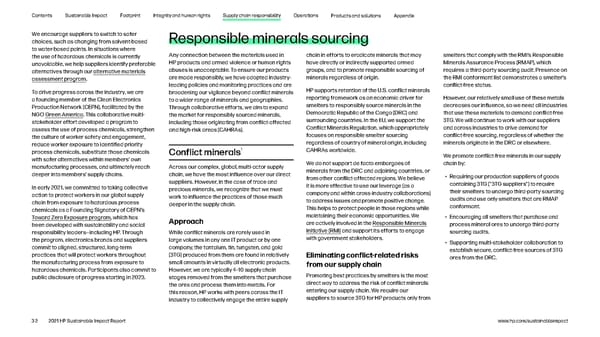Contents Sustainable Impact Footprint Integrity and human rights Supply chain responsibility Operations Products and solutions Appendix We encourage suppliers to switch to safer Responsible minerals sourcing choices, such as changing from solvent-based to water-based paints. In situations where the use of hazardous chemicals is currently Any connection between the materials used in chain in efforts to eradicate minerals that may smelters that comply with the RMI’s Responsible unavoidable, we help suppliers identify preferable HP products and armed violence or human rights have directly or indirectly supported armed Minerals Assurance Process (RMAP), which alternatives through our alternative materials abuses is unacceptable. To ensure our products groups, and to promote responsible sourcing of requires a third-party sourcing audit. Presence on assessment program. are made responsibly, we have adopted industry- minerals regardless of origin. the RMI conformant list demonstrates a smelter’s leading policies and monitoring practices and are conflict-free status. To drive progress across the industry, we are broadening our vigilance beyond conflict minerals HP supports retention of the U.S. conflict minerals a founding member of the Clean Electronics to a wider range of minerals and geographies. reporting framework as an economic driver for However, our relatively small use of these metals Production Network (CEPN), facilitated by the Through collaborative efforts, we aim to expand smelters to responsibly source minerals in the decreases our influence, so we need all industries NGO Green America. This collaborative multi- the market for responsibly sourced minerals, Democratic Republic of the Congo (DRC) and that use these materials to demand conflict-free stakeholder effort developed a program to including those originating from conflict-affected surrounding countries. In the EU, we support the 3TG. We will continue to work with our suppliers assess the use of process chemicals, strengthen and high-risk areas (CAHRAs). Conflict Minerals Regulation, which appropriately and across industries to drive demand for the culture of worker safety and engagement, focuses on responsible smelter sourcing conflict-free sourcing, regardless of whether the reduce worker exposure to identified priority regardless of country of mineral origin, including minerals originate in the DRC or elsewhere. process chemicals, substitute those chemicals Conflict minerals1 CAHRAs worldwide. with safer alternatives within members’ own We promote conflict-free minerals in our supply manufacturing processes, and ultimately reach Across our complex, global, multi-actor supply We do not support de facto embargoes of chain by: deeper into members’ supply chains. chain, we have the most influence over our direct minerals from the DRC and adjoining countries, or from other conflict-affected regions. We believe • Requiring our production suppliers of goods suppliers. However, in the case of trace and it is more effective to use our leverage (as a containing 3TG (“3TG suppliers”) to require In early 2021, we committed to taking collective precious minerals, we recognize that we must their smelters to undergo third-party sourcing action to protect workers in our global supply work to influence the practices of those much company and within cross-industry collaborations) chain from exposure to hazardous process to address issues and promote positive change. audits and use only smelters that are RMAP deeper in the supply chain. This helps to protect people in those regions while conformant. chemicals as a Founding Signatory of CEPN’s Toward Zero Exposure program, which has Approach maintaining their economic opportunities. We • Encouraging all smelters that purchase and been developed with sustainability and social are actively involved in the Responsible Minerals process mineral ores to undergo third-party responsibility leaders—including HP. Through While conflict minerals are rarely used in Initiative (RMI) and support its efforts to engage sourcing audits. the program, electronics brands and suppliers large volumes in any one IT product or by one with government stakeholders. • Supporting multi-stakeholder collaboration to commit to aligned, structured, long-term company, the tantalum, tin, tungsten, and gold establish secure, conflict-free sources of 3TG practices that will protect workers throughout (3TG) produced from them are found in relatively Eliminating conflict-related risks ores from the DRC. the manufacturing process from exposure to small amounts in virtually all electronic products. from our supply chain hazardous chemicals. Participants also commit to However, we are typically 4–10 supply chain public disclosure of progress starting in 2023. stages removed from the smelters that purchase Promoting best practices by smelters is the most the ores and process them into metals. For direct way to address the risk of conflict minerals this reason, HP works with peers across the IT entering our supply chain. We require our industry to collectively engage the entire supply suppliers to source 3TG for HP products only from 32 2021 HP Sustainable Impact Report www.hp.com/sustainableimpact
 HP Sustainable Impact Report Page 31 Page 33
HP Sustainable Impact Report Page 31 Page 33